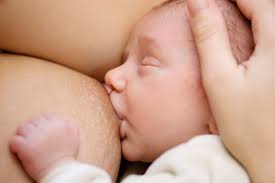
Breastfeeding is very beneficial to the mother and the infant. A lot of new mothers get nervous about breastfeeding because they hear all the bad things about it, such as it is painful. Breastfeeding isn’t going to be easy but in the long run, it is beneficial for the health of the mother and infant. New mothers need to hear the positive things that they are doing for their newborn children.
Benefits of Breastfeeding for the Mother
New mothers do not know the benefits of breastfeeding. For this instance, mothers are being counseled about the maternal benefits of breastfeeding. The reason for counseling mothers about breastfeeding was for mothers to understand the relationship between lactation and the nine maternal conditions. These maternal conditions include hypertension, hyperlipidemia, ovarian cancer, uterine cancer, heart disease, breast cancer, diabetes, postpartum weight loss, rheumatoid arthritis. Women were also counseled on obstacles that they may face during breastfeeding, which include mastitis and a decreased libido ( Schwarz et al, 2017). Mothers were given surveys pre-and post- counseling and the numbers increased significantly about knowledge of maternal health and the benefits of breastfeeding. Once mothers received counseling, results showed that information about the maternal health effects of lactation can play a huge role in helping women decided exclusively to breastfeed.
Secondly, some mothers also lack knowledge and how long to breastfeed. About 40% of women knew that the use of a pacifier during breastfeeding would reduce the duration and about 60% of women were ignorant about using a pacifier. About 54% of women knew about the two-year breastfeeding duration period. Only approximately 38% of women thought to exclusively breastfeed for a year. When moms were asked about cow’s milk and formula milk that can cause an allergy and obesity, 48% of moms knew about this whereas 52% did not. Ninety percent of women were aware that breastfeeding can reduce childhood infection and breastfeeding can be continued during childhood illness. Some benefits of breastfeeding for the mother are to help reduce placenta explosion, reduce bleeding, delay fertility, reduces obesity, diabetes, heart disease, and reduce the risk of osteoporosis. Breast milk can improve brain size in the newborn (Rehman et al., 2017). It is also said that women of higher education and higher income were less likely to breastfeed their children.
Benefits of Breastfeeding for a Newborn
One of the benefits of breast milk is it can stimulate the immune system for babies, which protects the babies against acute respiratory infections, diarrhea, urinary tract infections, necrotizing enterocolitis, bacterial meningitis, sudden death syndrome, and lymphoma. Breast milk is rich in carbohydrates, proteins, fats, minerals, and vitamins. Breastfeeding also forms a bond between the mother and baby. It can also help reduce the weight gained during pregnancy. Colostrum is the first produced when an infant starts to breastfeed. Colostrum has IgA antibodies that are passed to the infant during feedings. Approximately less than 40% of women exclusively breastfed their infants for the first six months of the baby’s life. Infants who are not breastfed are vulnerable to infections (Jacdonmi & Suhainizam, 2016).
Another benefit of breastfeeding is that it helps prevent childhood oral and dental diseases. A mother who breastfeeds their infants can reduce the risk of malocclusion, collapsed forms, snoring, and sleep apnea. Exercising the oral and facial muscles while breastfeeding can reduce approximately up to 50% of cases of malocclusion. When a mother breastfeeds her infant, it helps promote the development of correct positioning of the dental arches. Also, breastfeeding strengthens the infant’s nasal breathing, helps better position the tongue, good development of oral muscles, prevents atypical deglutition patterns, correct palate formation, and increases salvia ( Anyanechi wt al., 2017). Mothers expressed that they were willing to breastfeed their infants longer once they knew the benefits of oral and dental health. There was a significantly low percentage of mothers who did not know the benefits of breastfeeding their children.
Conclusion
In the end, breastfeeding has great benefits for the mother and the newborn. Latching the baby onto the mom’s breast can be painful at times, but the baby may not be latched on to the breast correctly. If the mother is soon the proper way to latching the newborn onto her breast it will make things easier for her and the newborn. The mother and the infant both benefit from breastfeeding, which includes all the health benefits. If a mother feels like she is not doing enough for her child remind her of all the amazing things that she is doing with her breast milk.
References:
Anyanechi, C. E., Ekabua, K. J., Ekpenyong, A. B., & Ekabua, J. E. (2017). Parturients’Awareness and Perception of Benefits of Breast Feeding in the Prevention of Infant and Childhood Oral and Dental Diseases. Ghana Medical Journal, 51(2), 83–87.https://doi.org/10.4314/gmj.v51i2.6
Jacdonmi, I. tse, Suhainizam, M. S., & Jacdonmi, G. R. (2016). Breastfeeding, a child survival strategy against infant mortality in Nigeria. Current Science (00113891), 110(7), 1282– 1287 https://doi.org/10.18520/cs/v110/i7/1282-1287
Rehman, R., Malik, F. R., Sabiha, Z. U. A., & Rehman, Z. (2017). Awareness of Mothers Regarding Duration and Benefits of Breastfeeding. Gomal Journal of Medical Sciences, 15(2),78–82.
Schwarz, E., Ross-Cowdery, M., Corbelli, J., Lewis, C., & Papic, M. (2017). Counseling About the Maternal Health Benefits of Breastfeeding and Mothers’ Intentions to Breastfeed. In Maternal & Child Health Journal (Vol. 21, Issue 2, pp. 234–241).https://doi.org/10.1007/s10995-016-2130-x
